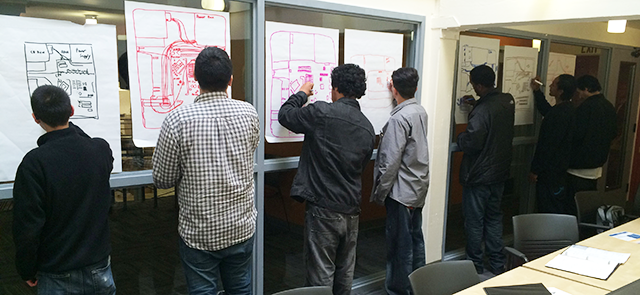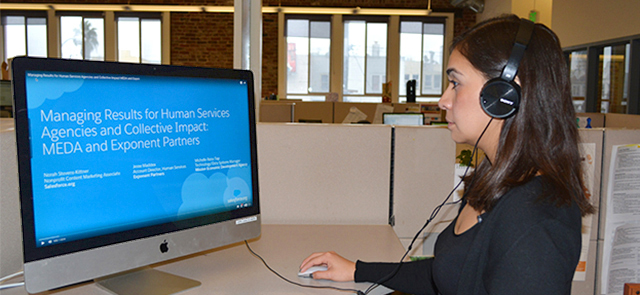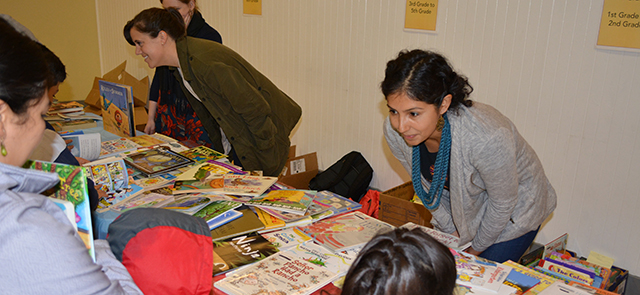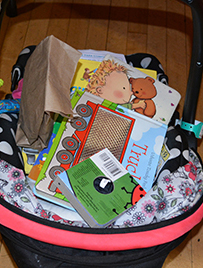Last weekend, politicians, community partners, parent advocates and a bevy of dedicated volunteers came together to offer support to the habitually underresourced families of the Mission District. With 450 attendees — and 300 of them kids — the impact was huge. From educational workshops to partners offering free resources to supply-laden backpacks being distributed, the Mission Promise Neighborhood Education Forum 2016 was a definite success.
“The community came out on a Saturday to help you get your children ready for the next school year. The Mission Promise Neighborhood is excited to head into our fourth school year. We are seeing impact and know we will see even greater successes in 2016-17,” stated MEDA Executive Director Luis Granados in his welcoming statements. MEDA is the lead agency of this education initiative.
Granados was followed by Assemblymember David Chiu of the 17th District, who took to the podium toting baby Lucas, who turned 5 months old that day. Chiu explained how his parents were immigrants, as is his wife, so he understands the importance of a community making their voice be heard. He then implored the crowd to vote for this November’s Immigrant Parent Right to Vote proposition, which would allow undocumented parents to vote in School Board elections. “One-third of school parents in San Francisco currently have no say in their children’s education. When you are engaged in schools, my son, Lucas, will benefit,” Chiu explained to loud applause.
Following Chiu was Dean Jorge Bell of City College-Mission Campus, which generously offered its Mission campus on Valencia Street as the venue for the day’s event. This was the first time City College and the Mission Promise Neighborhood had teamed up. Bell extolled the need for parents to take college classes to better their lives by saying, “We have so much talent in the neighborhood, but that talent is a diploma away from translating to true success.”
Next up was Trustee Brigitte Davila of City College of San Francisco, who echoed Bell’s advice on the life-changing effect of obtaining an education. Davila was the first in her family to go to college, and she is now a professor at San Francisco State University, where she teaches government and policy classes.
The final speaker was Mission Promise Neighborhood’s Lucia Obregon, who took to the podium and showed an in-depth data presentation of issues needing to be addressed in the community.
As families then headed to take 60-minute workshops over the next couple of hours, some parents brought their young ones to the child care room, replete with activities to foster early learning. There was a large poster stating “Yo Soy la Mission,” with little ones drawing an outline of their handprints in crayons of various hues and then writing their names inside. There was even a “Design Your Neighborhood” interactive exhibit, with kids building community landmarks out of shoeboxes and placing them on the Mission map laid out on the floor. Finally, with reading to children ages 0-5 a major goal of the Mission Promise Neighborhood, Tandem, Partners in Learning was brought in to do what they do best. Said Program Supervisor Kaitlin Pearce of Tandem, “We had many meaningful interactions with families and child care providers, and we really appreciate you providing us access to share our information with the participants. I’m impressed at how the Education Forum continues to grow each year.”
Members of La Colectiva served as caregivers. One of their tasks were to feed the always-hungry children, finding a way to satisfy even those with the most finicky of palates.
Univision was also in attendance, setting up a booth in the City College courtyard and handing out “Vota” bags, as the Latino station backed today’s message of the community letting its voice be heard. Univision even provided a number of keepsakes to fill the bags.
Heading back to the auditorium, it was time to learn of parent advocacy. That occurred by Marco Ponce, Lourdes Dobarganes and Luz Rodríguez of the Mission Promise Neighborhood Parent Advisory Council (Concilio de Padres) taking turns at the podium — a powerful moment, as this was the first time any of them had addressed such a large crowd. Each spoke profoundly about how becoming a parent-advocate had bettered their lives, and the lives of those in the Mission community. The advocates made a call to action to those in the crowd to join the next cohort of the Parent Advisory Council, which starts this fall.
The excitement then grew as ScholarShare drew names for a raffle of five Chromebooks that the nonprofit had donated. Attendees clung to their raffle tickets as numbers were called out, with audible shouts of glee from winners. Being connected to a computing device at home is important for Mission Promise Neighborhood families, so these devices were definitely appreciated … and will be well used.
It was then time for distribution of supplies and backpacks. The Mission Promise Neighborhood team staffed a table of donated books, with exuberant children finding their favorites. All courtesy of the San Francisco Public Library.
There were even 750 tickets doled out for free admission to the Asian Art Museum, the Exploratorium and Yerba Buena Center for the Arts.
Backpacks came from combined donations: 300 from Mission Lodge 169, with Factory 2-U’s donated supplies for these backpacks running the gamut from notebooks and pens to calculators and folders; 250 from the Mayor’s Office of Neighborhood Services (MONS), 46 from DoubleDutch; and 25 from LinkedIn’s HOLA group, with these brought to Mission Promise Neighborhood offices during a recent scavenger hunt held by the tech giant’s Latino group.
Senior Advisor/Director of Neighborhood Services Derick Brown of MONS spoke of the importance of this event as follows: “For the past 10 years, MONS, together with several City agencies, corporations such as Target and community-based organizations like Mission Promise Neighborhood, has worked to improve the educational experiences of children in the Bay Area by providing them with the resources necessary for academic success. San Francisco is home to thousands of elementary and middle school age youth in need of support inside and outside the classroom. The Mayor’s Annual Backpack Giveaway represents our unyielding commitment to the City’s youth, and helps to ensure thousands of young students are prepared for the upcoming school year. We really appreciate Mission Promise Neighborhood’s commitment to youth and leading by example. The Education Forum 2016 was a wonderful event and a much-needed resource for our community. Great job!”
The stuffing of so many backpacks was made possible courtesy of the formidable efforts of Mission Promise Neighborhood staff and partner volunteers. Executive Director Edward Kaufman of Mission Graduates could be seen filling backpacks for hours. Kaufman later donned City College’s ram mascot outfit for the backpack giveaway, much to the delight of the kids — and their parents.
Stated Kaufman of why his organization took part in today’s event: “Mission Graduates was proud to be a partner once again of the Mission Promise Neighborhood Educational Forum. I was impressed at the array of services available to the parents attending by the partnering agencies, ranging from health care to housing to child care to legal support. Parents and families were engaged and excited to learn more. The energy was infectious!”
Other partners were tabling all day, a steady stream of attendees learning of free resources to strengthen their families. Community-based organizations present included Housing Rights Committee, La Raza Centro Legal, Mission Neighborhood Centers, Mission Neighborhood Health Center and Support for Families.
Summing up the day’s event, Mission Promise Neighborhood Family Success Coach Manager Amelia M. Martínez C., who spearheaded the event, explained, “It takes a solid community effort to ensure our students are prepared for the school year. We had families lining up a couple of hours before we opened the door for registration. This showcases the need in the community — a need that I am proud to say was successfully fulfilled today. Not only was that need fulfilled, we also put forth the message of advocacy, which is vital in our community. Thanks to everyone who contributed to this event.”
____________________________________________________________
The Mission Promise Neighborhood would like to thank our Education Forum 2016 event sponsors:
DoubleDutch
Factory 2-U
LinkedIn
Mayor’s Office of Neighborhood Services
Mission Lodge 169
San Francisco Public Library
Scholarshare
Univision
Thanks also go out to our partners who were part of our event planning committee:
City College of San Francisco
Good Samaritan
Housing Rights Committee
Jamestown Community Center
La Raza Centro Legal
MEDA
Mission Graduates
Mission Neighborhood Centers
Mission Neighborhood Health Centers
San Francisco Unified School District
Support for Families
Tandem, Partners in Early Learning
____________________________________________________________
About Mission Promise Neighborhood
The Mission Promise Neighborhood is a citywide community partnership that was created to support kids and families living, working and attending school in the Mission District. It brings together schools, colleges, community organizations and community leaders to help kids graduate and families achieve financial stability.
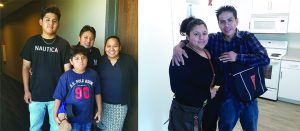 “For all families, health starts with food on the table and a roof over our heads. It warms our hearts to see the smiles on the faces of these families in their new and secure homes,” says Executive Director Brenda Storey of Mission Neighborhood Health Center (MNHC). She was speaking in general about Mission Promise Neighborhood families, and specifically of the families of siblings Jazmin and Marcos Florian. MNHC has served the Mission’s Latino community for almost five decades and is a valued Mission Promise Neighborhood partner.
“For all families, health starts with food on the table and a roof over our heads. It warms our hearts to see the smiles on the faces of these families in their new and secure homes,” says Executive Director Brenda Storey of Mission Neighborhood Health Center (MNHC). She was speaking in general about Mission Promise Neighborhood families, and specifically of the families of siblings Jazmin and Marcos Florian. MNHC has served the Mission’s Latino community for almost five decades and is a valued Mission Promise Neighborhood partner.
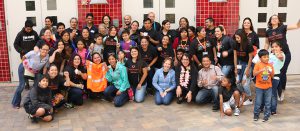 With an eye toward the exciting start of school, 110 families attended Mission Promise Neighborhood’s third annual Education Forum at the Mission Campus of City College on July 29. The theme was ”Putting Success in a Backpack,” but the event offered so much more. (See
With an eye toward the exciting start of school, 110 families attended Mission Promise Neighborhood’s third annual Education Forum at the Mission Campus of City College on July 29. The theme was ”Putting Success in a Backpack,” but the event offered so much more. (See 